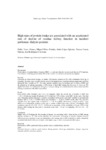High rates of protein intake are associated with an accelerated rate of decline of residual kidney function in incident peritoneal dialysis patients

Use this link to cite
http://hdl.handle.net/2183/25715Collections
- Investigación (FCS) [1293]
Metadata
Show full item recordTitle
High rates of protein intake are associated with an accelerated rate of decline of residual kidney function in incident peritoneal dialysis patientsAuthor(s)
Date
2019-01-04Citation
Otero Alonso P, Pérez Fontán M, López Iglesias A, García Falcón T, Rodríguez-Carmona A. High rates of protein intake are associated with an accelerated rate of decline of residual kidney function in incident peritoneal dialysis patients. Nephrol Dial Transplant. 2019;34(8):1394-1400
Abstract
[Abstract]
Background
Preservation of residual kidney function (RKF) is a relevant objective in peritoneal dialysis (PD) patients. The influence of dietary protein intake (PI) on this variable has not been adequately investigated.
Methods
Following an observational design, we studied 336 patients incident on PD, with a minimum follow-up of 6 months. The main study variable was the mean PI [normalized rate of protein nitrogen appearance (nPNA)] during the first 4 months on PD. The main outcome variables were the absolute rate of decline of RKF and the proportion of patients presenting a >50% decay of their RKF during the first year of follow-up. We applied univariate and multivariate strategies of analysis, taking into consideration the main control variables bearing a correlation with nPNA and/or RKF.
Results
Mean nPNA (first 4 months) was 1.23 ± 0.33 g/kg/day, while the overall rate of decline of RKF was −0.13 ± 0.29 mL/min/month; 69 patients (25.1%) had lost >50% of their initial RKF by the end of the first year. Univariate analysis disclosed consistent associations between the main study variable on one hand and baseline RKF (r = 0.32, P < 0.0005) and its rate of decline (r = −0.23, P < 0.0005) on the other. The latter two variables were also significantly correlated (r = −0.36, P < 0.0005). Multivariate analysis identified mean nPNA as an independent predictor of the rate of decline of RKF [odds ratio 1.09 per 0.10 g/kg/day, 95% confidence interval (CI) 0.99–1.19, P = 0.058] and, in particular, of the probability of losing >50% of the baseline RKF during the first year of treatment (odds ratio 1.15 per 0.10 g/kg/day, 95% CI 1.04–1.27, P = 0.006).
Conclusion
Higher rates of PI during the first months of therapy are associated with a faster decline of RKF among patients incident on PD. Our results underline the convenience of keeping an adequate balance between sufficient protein ingestion, to prevent malnutrition and wasting, and sensible restriction in stable, adequately nourished individuals with rates of intake in the higher range or above-recommended allowances.
Keywords
Malnutrition
nPNA
Peritoneal dialysis
Protein intake
Residual kidney function
nPNA
Peritoneal dialysis
Protein intake
Residual kidney function
Editor version
Rights
This is a pre-copyedited, author-produced version of the article accepted for publication in Nephrology Dialysis Transplantation following peer review. The version of recors is avaliable online at Oxford Academic web page.
ISSN
0931-0509
1460-2385
1460-2385





